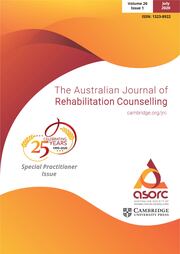No CrossRef data available.
Article contents
Biopsychosocial Assessment of Impulsivity in Persons With Severe Mental Illness
Published online by Cambridge University Press: 15 October 2015
Abstract
The efficacy of institutional and community-based treatment services is crucial in maintaining the health, safety, and quality of life of persons with psychiatric illness. A factor limiting the success of community interventions is the rehospitalisation of persons with mental health disorders due to behavioural concerns, particularly aggression toward self and others. Understanding impulse control, a construct commonly thought to have a relationship to aggressive behaviour, may provide psychologists with insights into individual behaviour in novel or unpredictable environments. This study examines the validity of biopsychosocial assessment of impulsivity in understanding inpatient behaviour in 53 individuals currently residing in a State psychiatric facility. Using three separate measures of impulsivity, a regression analysis was used to determine the predictive value of these measures in relation to institutional behaviour. Support was found for using impulsivity assessment as a predictor of institutional behaviour. Discussion and suggestions for utilising biopsychosocial assessment of impulsivity in inpatient and community settings is provided.
- Type
- Articles
- Information
- The Australian Journal of Rehabilitation Counselling , Volume 14 , Issue 2 , 01 September 2008 , pp. 69 - 78
- Copyright
- Copyright © Cambridge University Press 2008


